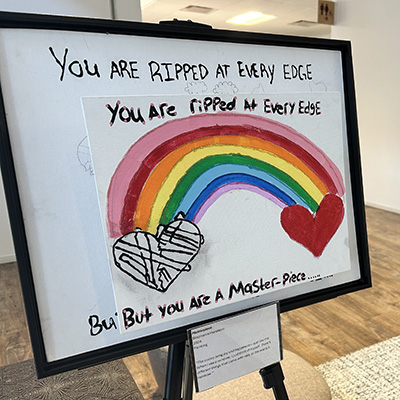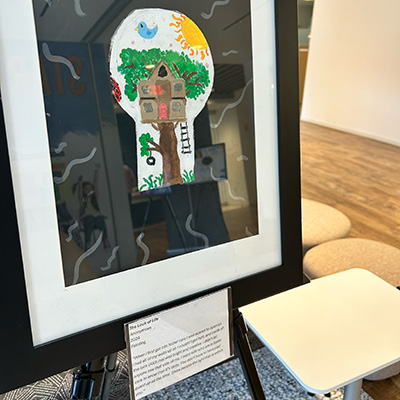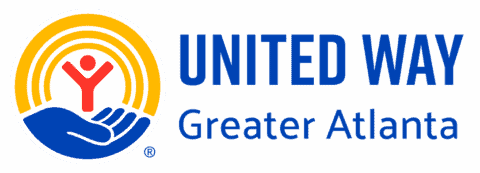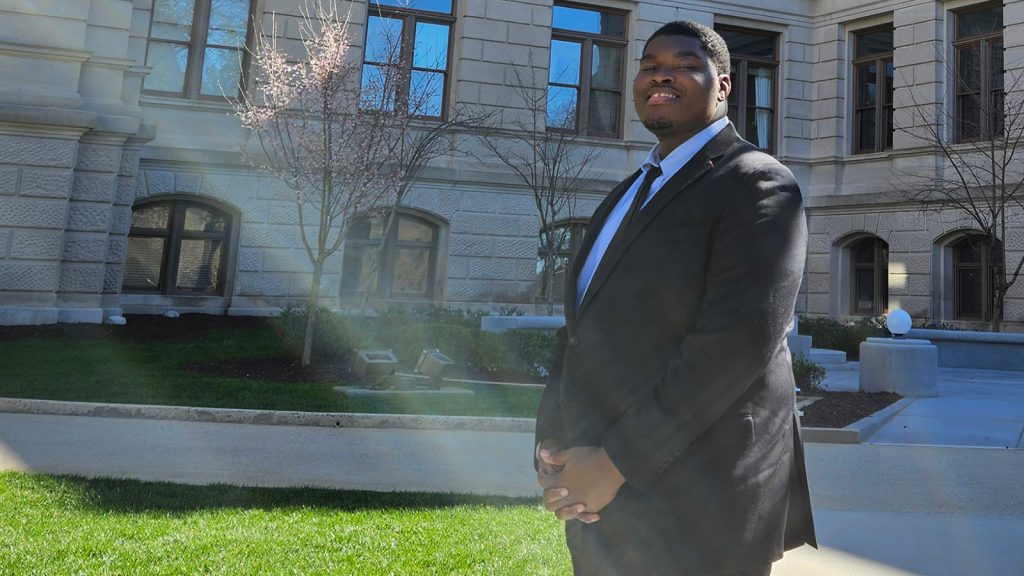Eshontee remembers what it was like to go to college. As a youth transitioning out of the foster care system, college gave her the chance to create a plan and circle of friends who became like family. However, in her senior year, she was on the brink of moving into her car, due to room and board costs she couldn’t manage on her own.
Five years later, United Way of Greater Atlanta’s Youth Advocacy Initiative gives her a voice and a platform to change the story for the next generation of youth in similar backgrounds. Now she’s working to pass Senate Bill 85: The Georgia Foster Care Scholarship Act, offering scholarships that would cover tuition, room, board, meal plans, and books that could change lives for young adults like her.
Across Greater Atlanta, we identified nearly 14,000 opportunity youth, young people who are not in school and not working. Youth transitioning out of the foster care system make up a portion of this group most in need of support as they navigate adult life without traditional family supports.
United Way of Greater Atlanta launched the Youth Advocacy Initiative in 2024 for these transition age youth, powered by Hilton Foundation. We bring together nonprofit organizations, system leaders, and, most importantly, youth who have experienced the system firsthand together to help youth in foster care transition successfully to adulthood.
“The youth that we serve often look to people who can relate to their story,” shared Regginald Hollaway, a youth advocate. “It means so much to have people who have experienced what they’ve experienced and are able to talk from that lens, instead of from adults they’re not sure they can trust. The adults who have that same lived experience can be the best support to them.”
Not politically popular, but needed nonetheless
Currently, 11,000 Georgia youth are in the foster care system, and according to research by Emory’s Barton Child Law and Policy Center, outcomes in the foster care system are worsening. For example, the average length of stay in the foster care system is almost 20 months in Georgia, compared to 7 months in the U.S overall.
Melissa Carter, Executive Director of the Barton Center and a member of our Youth Advocacy Initiative, says that management of the child welfare system and the routine needs of children in foster care are not “politically popular” this legislative session, which is why the need for advocacy groups are so important.
As Eshontee’s story demonstrates, when these youth in care take on college, paying for tuition is one barrier (hers was covered by an existing educational training voucher for foster youth), but the system truly breaks down when it comes to supporting wraparound needs like housing or food while in school.
“Typically the highest needs for young people attending college are housing, transportation, and food security,” said Eshontee. “There’s a passion for young people to go to college and to attend four-year universities, technical schools, or pick up a trade. But with these survival needs, people aren’t able to focus on their education. They don’t do as well in school and they end up flunking out of school if they do go, or if they don’t flunk out of school, they end up having a lot more barriers and it takes a lot even longer to graduate. We’ve been fighting diligently to try to make sure that those supports are in place.”
Youth advocates take on the Capitol
Under the Youth Advocacy Initiative, we bring together groups of foster youth to get their perspective of what to advocate for, and which partners can best aid us in the work. One partner, Multi-Agency Alliance for Children, trains youth on how to work alongside state lawmakers to change the foster care system for the better.
Regginald and Eshontee both visited the Georgia State Capitol along with other youth advocates throughout the legislative session. They introduced themselves to legislators throughout the day, met with other nonprofits who were there organizing, and distributed information to offices. There are several bills on their agenda impacting youth experiencing foster care, but GA SB-85 is top of mind—a bill that won popular support in both houses, and was sent to the governor’s desk at the end of the 2025 legislative session.
“It’s a beautiful thing, not only as a former foster youth but also someone who’s been on the other side, in college and now graduated, to be a part of the initiative by going to the Capitol, using my voice, and propelling initiatives,” said Regginald.
When words aren’t enough



Youth advocates are often balancing advocacy work with college or the demands of a full-time job, but we try to center their voice in all Youth Advocacy Initiative meetings even if they aren’t able to be in the room. One way we’ve done this is through an art exhibit that features stories of youth in foster care in visual art form.
The “See Me” exhibit, curated by Youth Advocacy Initiative partner Georgia Appleseed, includes paintings, poetry, and other displays that show the emotional turbulence, uncertainty, but ultimately, resiliency of youth in care.
“I’m always questioning what’s gonna happen…there’s places I go every day in my mind. My thoughts are always wandering. Foster care is a scary adventure. You never know what’s coming at you, so you have to be strong,” wrote one young artist, whose piece shows a self-portrait on top of a network of roads.
“Many youth who have lived through trauma, poverty, and racism, are asked to tell their story over and over again,” says Liz McDaniel, Director of Engagement and Development at Georgia Appleseed. “See Me allows them to share their experiences without having to talk about over and over again with adults they don’t know.”
Building on a legacy of foster care improvement
Advocacy efforts work hand in hand with our direct work providing apprenticeships and other career opportunities to youth.
>> Read More: Leah’s Apprenticeship Story
“The reason why we’ve been so passionately working on these bills is to make sure that no young person has to experience the things that we have experienced,” said Eshontee.
Eshontee and Regginald both credit their success to starting at a better place because of the advocates before them. Things that they were able to do, from having access to Medicare as young adults, to having the foster age being raised from 18 to 21, to even being eligible to get a driver’s license while in care, all came about from advocates just like them.
[Pull quote]“Just to see the shoulders that we stand on, and to see the legacy that we are imparting to the next generation so other young people can take advantage of the things that we’re fighting for is truly inspiring. I’m so excited to see what’s to come, and what other great things we fight for and accomplish, to make sure that young people that experience foster care have an equitable start, just like everybody,” said Eshontee.
Advocacy on behalf of youth transitioning out of foster care is just one focus of United Way of Greater Atlanta’s public policy agenda, which focuses on the holistic well-being of children. You can read our full public policy agenda here.
And to join us in empowering youth transitioning out of the foster system, consider donating to our work, which funds programs like CareerReady ATL and College Bound to create pathways to the future for youth furthest from opportunity.

